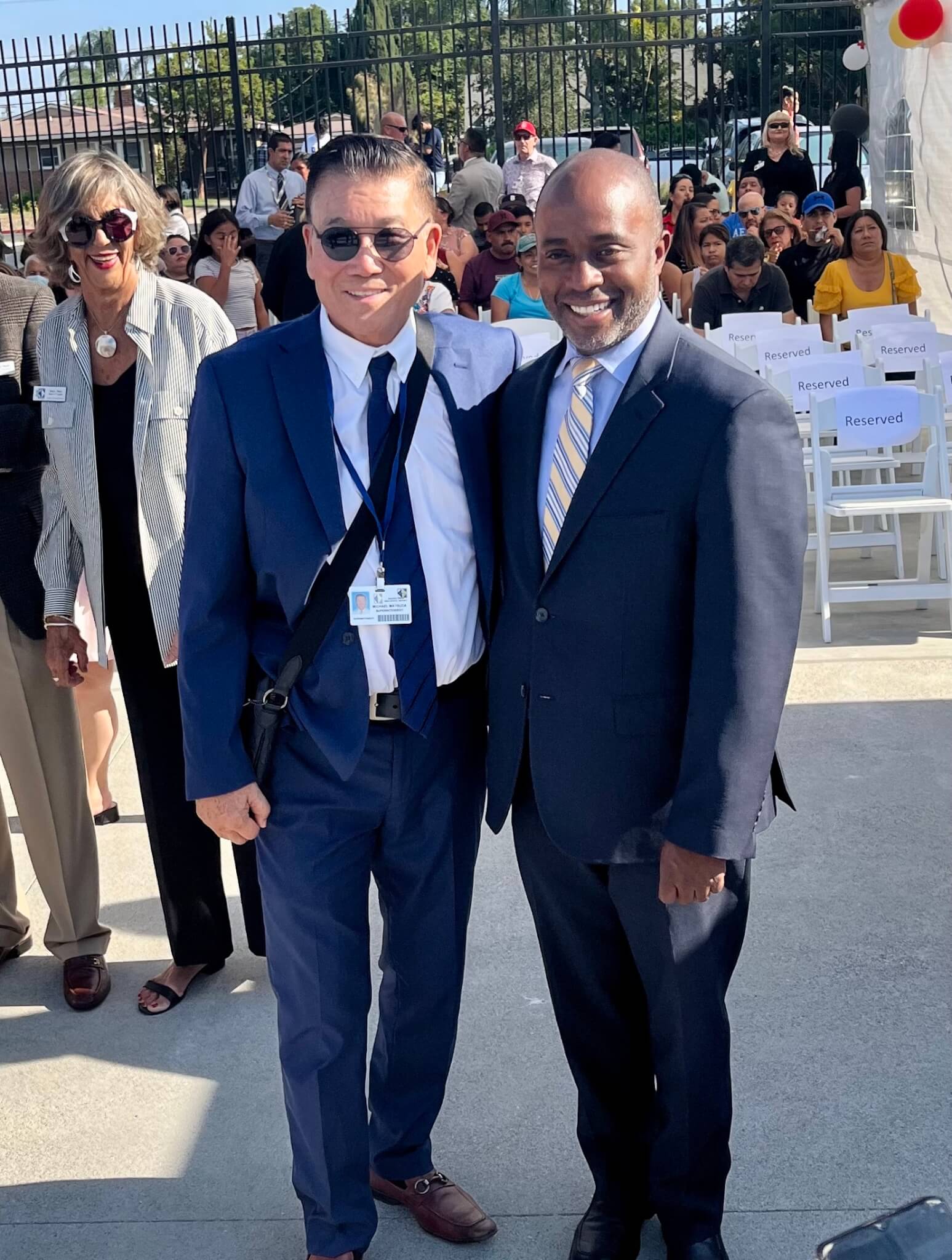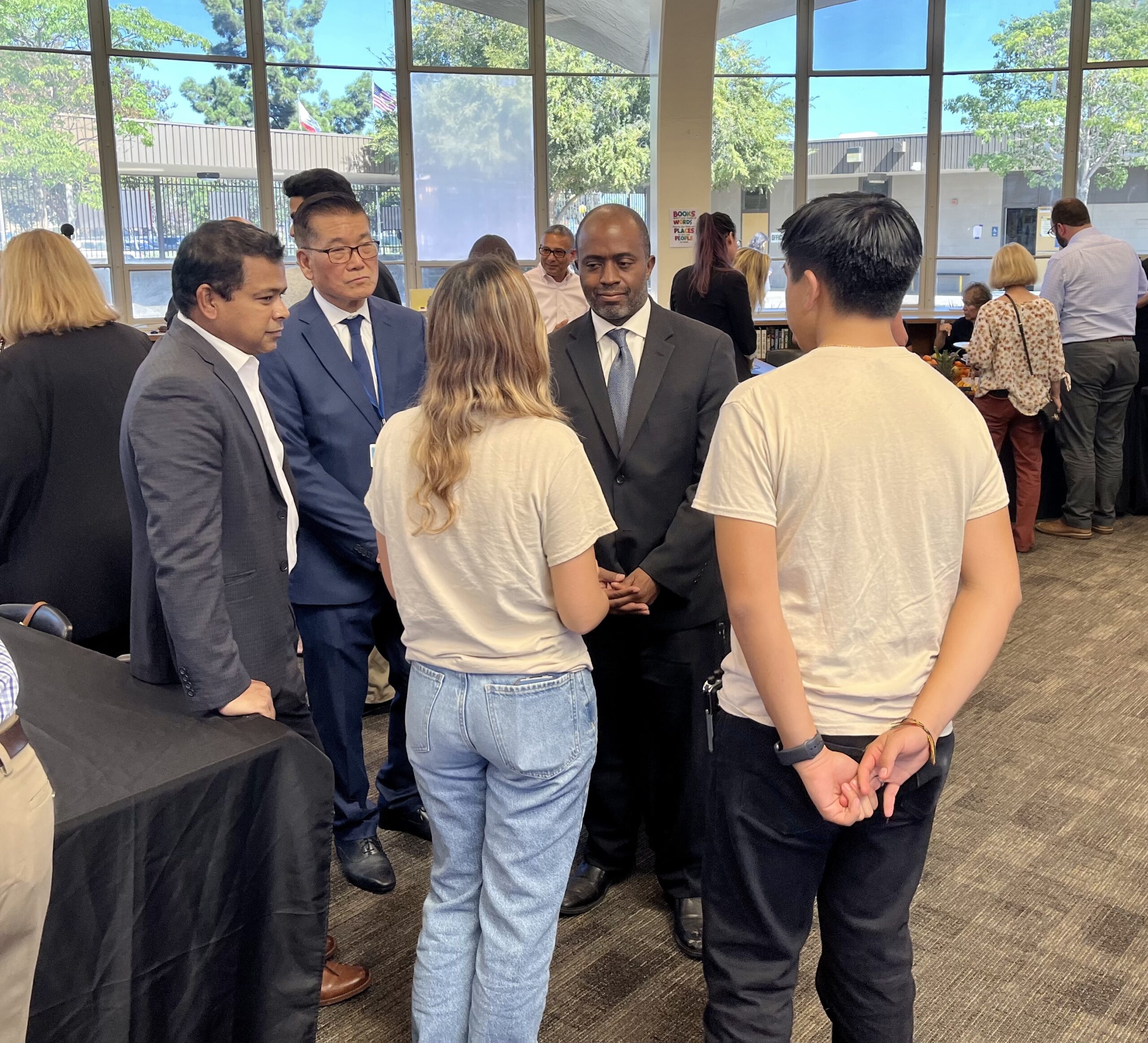The Magnolia Agriscience Community Center (MACC) is an urban agricultural oasis built on the Magnolia High School campus within the Anaheim Union High School District (AUHSD). The project strives to educate students, families, and the community about sustainable agricultural practices, food nourishment, and community building. Using this approach, AUHSD hopes that promoting a greater understanding of how food is cultivated right in their own neighborhood will lead to a social and cultural shift in how those in the surrounding community approach food habits.
As a school district committed to a community schools approach, the district focuses on the needs and assets of the community by finding ways to provide each neighborhood with support and services that are both created and run by people who understand the community best. Community schools are the heart of the community, where the school is rich in resources that help meet parent and family needs. For example, AUHSD recognized a lack of access to healthier food options. Many AUHSD schools are situated in low-income, low-access neighborhoods where residents struggle to find affordable, organic fruits and vegetables. Many neighborhoods have more fast food and convenience stores readily accessible than supermarkets offering fresh local produce—areas that are commonly known as food deserts.
In July of 2021 AUHSD’s board of trustees approved funding to build a 2.5-acre urban regenerative farm and community center aimed at alleviating food insecurity and educating students and their families about ecological sustainability, urban regenerative farming practices, and civic engagement through action projects in the classroom to help students become agents of change. (See a Magnolia High School student’s speech on food deserts.) In January of 2022 AUHSD was awarded $250,000 from the Samueli Foundation to jump-start the physical build of the farm with ongoing program support from the foundation. The MACC farm is being built in three phases, with phase one, totaling 1.25 acres, scheduled for completion at the time of publishing.

Where does the MACC farm harvest go? The produce grown at the MACC farm is used to support the community in multiple ways. AUHSD’s food services department currently purchases the MACC-grown vegetables, which are added to menu items and as salad bar supplements. Two AUHSD schools are currently using the MACC farm-to-cafeteria model, and the plan is to expand this model to four schools in the future. Second, the MACC farm sells produce boxes to all school staff and families in AUHSD. These produce boxes can be purchased and picked up at the desired school site. The produce box idea was born from a group of AUHSD students and City of Anaheim workforce development grant recipients. Students first studied the demographics of the AUHSD boundary areas, then they came up with marketing and business plans to help the community make a cultural and social shift in its eating habits. The produce boxes offered by the MACC farm include fresh veggies and fruits that are delivered on the same day they are harvested and come with a care kit from AUHSD’s iLab at Western High School, where students create innovative solutions to tackle issues in the community. A card that explains how to care for the vegetables, a healthy recipe explaining how to use vegetables that may be unfamiliar, and a 3D-printed item to help recipients use the vegetables in their kitchen are some of the items included in a care kit. Lastly, the MACC farm donates any leftover harvest to a local food pantry that accepts donations for families in need.

In addition to helping community members improve their health by offering more nutritious food options, the MACC farm also provides programming to help educate the community about nourishing bodies with healthy food as well as ecological sustainability. The MACC farm has partnered with the UC Irvine Science Project, which currently writes curriculum for seventh- to twelfth-grade students who come to the farm to experience learning labs. Learning labs are taught by UC Irvine college interns who are majoring in physical and life sciences. In these learning labs, interns teach AUHSD students about various topics, including pesticide use and runoff, the importance of pollinators, composting, plant chromatography, and much more. The MACC farm also hosts farm-to-table dinners for the community. Guests are treated to a farm tour, a three-course meal made from ingredients harvested on the MACC site, and a presentation by OC Master Gardeners and Orange Coast Community College health coaching interns about growing food at home and improving well-being by making healthy choices and setting goals.
AUHSD is transforming the educational process by using its Career Preparedness Systems Framework model to ensure that all students graduate with the skills and knowledge needed to be engaged citizens in their communities with workforce and life preparedness skills. Today, when trust in American institutions is ebbing, access to twenty-first-century/future-ready jobs is more vital than ever in monitoring the barometer of social justice. The educational work being done in classrooms and with families around the school district is leading the way to help students be actively engaged in their education. Using the MACC farm as an asset, students are using their voices to be active citizens and learning how to bring about positive environmental change to their urban settings while advocating for their own health and well-being.

